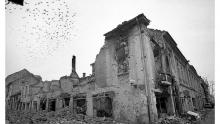Yugoslav People's Army
High-Level Suspects Charged, But Bosnia’s Dobrovoljacka Case Has Troubled History
The Bosnian state prosecution filed an indictment this week charging ten people with committing a war crime in Sarajevo on May 3, 1992, when a Yugoslav People's Army military convoy was withdrawing from the capital.
Bosnia Indicts Ten for Yugoslav Troops’ Deaths in Sarajevo
The Bosnian state prosecution said on Wednesday that it has charged ten suspects including Ejup Ganic, who was a member of Bosnia's presidency during the war, with committing war crimes against prisoners of war and civilians in the controversial Dobrovoljacka Street case.
Sarajevo Wartime Police Chief Cleared of Crimes Against Prisoners
The Bosnian state court on Thursday found Dragan Vikic and three co-defendants not guilty under a first-instance verdict of committing a war crime against prisoners of war who were killed in Veliki Park in Sarajevo in the early weeks of the siege of the city on April 22, 1992.
Serbia Grants Vukovar Massacre Convict Early Release
Miroljub Vujovic, a Serb wartime fighter who was convicted in Serbia of participating in killing some 200 prisoners from the Croatian town of Vukovar at the nearby Ovcara Farm in November 1991, has been granted early release based on the Belgrade Appeals Court's conclusion that his "resocialisation" is complete.
Montenegro Urged to Make War Crimes Prosecution Priority
View of the burning city of Dubrovnik, in Croatia, in November 1991, after air raids and artillery attacks by the Yugoslav Army. Photo: EPA/PETER NORTHALL
Croatia Finds Ten Suspected War Victims’ Bodies Near Vukovar
The Croatian Veterans' Ministry told BIRN that preliminary findings show that human remains discovered at an illegal landfill between the villages of Pacetin and Bobota near Vukovar are those of at least ten people who were middle-aged or older.
Croatia’s Vukovar After the Fall: Despatches from the Ruins
"No one will harvest the fruits of victory because there are none; all that is left is just the bitter taste of a hangover," said a report published in Belgrade-based Vreme magazine after the fall of the eastern Croatian town of Vukovar on November 18, 1991.
30 Years On, Search for Croatian Village Massacre Suspects Continues
Ivica Bilaver was a 13-year-old schoolboy in the autumn of 1991, when his home village of Skabrnja, near the Croatian city of Zadar, became the focus of fighting between Croatian forces and the Yugoslav People's Army and other Serbian fighters.
Stark Photographs Depict Siege of Croatia’s Vukovar
Milos Cvetkovic's photographs of the siege and capture of Vukovar go on display at the EndzioHub gallery in central Belgrade on Thursday evening, 30 years after the eastern Croatian town fell to the Yugoslav People's Army and Serbian paramilitaries.
The Fall of Vukovar: Oral History of a Croatian Town’s Destruction
The Yugoslav People's Army, aided by Serb Territorial Defence forces and paramilitaries from Serbia, launched a full-blown attack on Vukovar in eastern Croatia on August 25, 1991, beginning a siege that would last for 86 days and leave around 3,000 soldiers and civilians dead before the town's defenders had to surrender.









